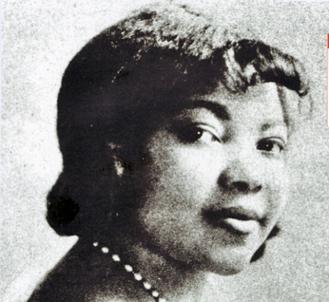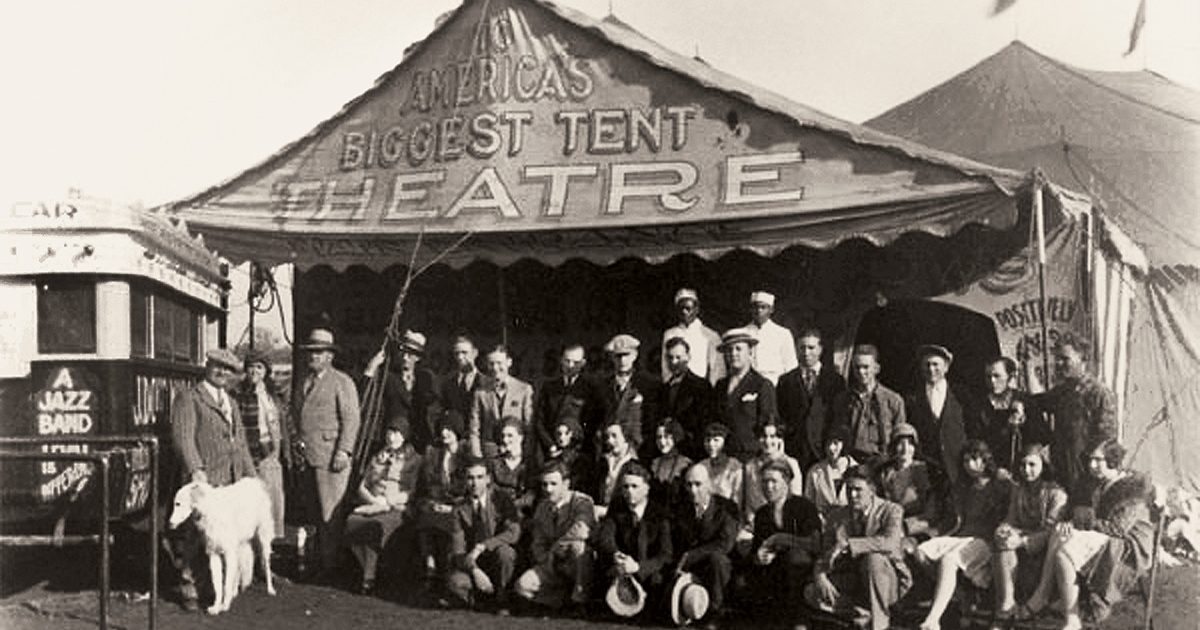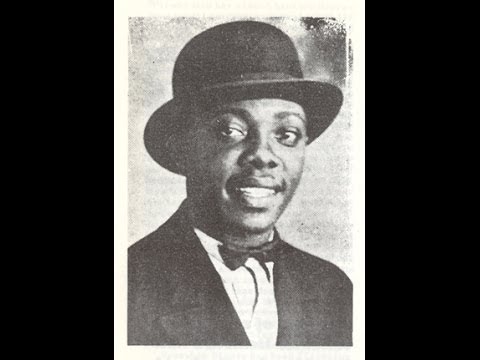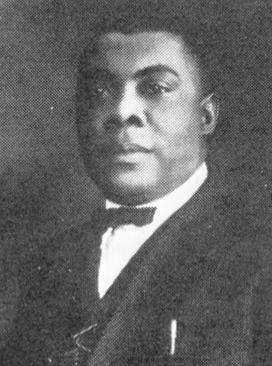
Beulah Thomas “Sippie” Wallace was born in Houston, Texas on November 1, 1898. She is the daughter of Fanny and George W. Thomas, Sr., and one of thirteen kids.
Because her father was the deacon of Shiloh Baptist Church, Sippie sang and played the organ in this house of worship.
During the summer months, Sippie Wallace went to tent shows throughout Houston and Dallas, where she would indulge in the performances of blues singers. Occasionally, she was asked to fill in an opening in the chorus lines for some tent shows and by the mid-1910s, she was acting, dancing, doing comedies, serving as a snake charmer’s assistant, and singing solo ballads.

According to Ashby, tent shows consisted of “inoffensive” routines such as three-act comedies or drama-vaudeville performances. Tent shows took place in various towns throughout Texas, and locations were often based on the size of the company (Ashby). Ashby states that these tent shows were generally embraced by the rural communities they performed in, as they were frequent sources of “commercial live entertainment.”


In 1915, Sippie Wallace and her younger brother Hersal Thomas moved to New Orleans to collaborate with their older brother George W. Thomas. George W. Thomas was a well-known pianist, songwriter, and publisher, and the siblings got to work with numerous musicians who would eventually become big names in the jazz/blues scene (a notable example is Louis Armstrong).
In 1923, Sippie and Hersal moved to Chicago where she eventually became acquainted with Ralph Peer, the general manager at Okeh Records. Sippie was advertised as the “Texas Nightingale” while working under Okeh, and would go on to record 48 songs between 1924 and 1927 (Michigan Woman Forward). According to Michigan Woman Forward, 28 of these songs were hits-including “Shorty George Blues,” which can be found in the next section. Sippie was nationally famous for these blues tunes, and even worked alongside prominent musicians such as Louis Armstrong, Johnny Dodds, Clarence Williams, among others.

A Note on Okeh Records Otto K. E. Heinemann, a German immigrant, founded Okeh Records in 1918 (CVinyl). Okeh was home to many artists specializing in various genres. However, due to the work of prominent blues artists that worked under the label, it became known as “a black music specialist” (CVinyl).
Unfortunately, the era of the Great Depression led to hardships for Sippie, as society’s love for blues started to diminish and tragic events in her personal life led her to move to Detroit in 1929 and revert back to gospel singing. Sippie stopped performing in 1937 after the death of her husband Matt Wallace (Michigan Woman Forward; Parker). However, in the 1960s, the blues revival led to a reignited interest in Wallace. During this time period, she collaborated with other female artists such as the Texan musician Victoria Spivey (in 1966 and 1970) and Bonnie Raitt (1970s-80s).
Due to her extensive and influential career, Parker notes that Wallace has been inducted into the Michigan Women’s Hall of Fame (1993), Blues Foundation Hall of Fame (2003), and Houston Institute for Culture’s Texas Music Hall of Fame.
The Peak Three
These three songs are great representations of Sippie Wallace’s range. The first two are credited as being some of her most famous works. The last song was selected because it was my personal favorite. Each song is unique in its own way.
Shorty George Blues
This tune by Sippie Wallace is one of her most popular songs. “Shorty George Blues” has sold over 100,000 copies nationwide, which Michigan Woman Forward states is the same as “going platinum” in today’s musical market.
| Lyrics |
| I wrote a letter and mailed it in the air You can tell by that I’ve got a friend somewhere But soon one morning, lord by the break of day Some low down woman stole my man away I lay down last night, trying to take my rest My mind starts to rambling like the wild goose in the west I went upon the mountain, looked far as could see The women had my man, lord and the blues got me I want all you women to strickly understand That if a man wears overalls he sure is no monkey man Short George is the only man that I chose He treated me good now I’ve got the Shorty George Blues |
I’m A Mighty Tight Woman
“Mighty Tight Woman,” another popular tune by the blues singer, is praised for its “tough-minded” lyrics that appealed to many young feminists of the 1970s (Parker). This song was covered by Bonnie Raitt, who helped “initiate [the] renewed interest” in Sippie Wallace during this time period.
| Lyrics |
| I’ve come to you sweet man Falling on my knees I’ve come to you, pretty papa Falling on my knees To ask, if you ain’t got nobody Kind darlin’, take me please ‘Cause I’m a mighty tight woman I’m a real tight woman, I’m a jack of all trades I can be yo’ sweet woman an’ also be yo’ slave I can do things so good ‘Til you will swear that I have a halo over me I hear ev’rybody saying That I’m tight in ev’rything that I do I’ve got all the men cryin’ I’m a broad that never feels blue All I want is a good man And I will make him happy too If you a married man You ain’t got no business here ‘Cause when you out with me I might make yo’ wife shed tears ‘Cause I’m a mighty tight woman And there is nothin’ that I fear |
Murder Gonna Be My Crime
Out of all the songs I heard by Sippie, this is one of my absolute favorites.
| Lyrics |
| Tell me, baby What in the world is wrong with your mind Talk to me, pretty poppa Tell me what in the world is wrong with your mind You keeps me worried And I’m bothered all the time Some folks thinks I’m happy But, oh, you don’t know Some folks thinks I’m happy But you don’t know You can never tell What goes behind closed doors You made me love you Now your lover girl’s done come You made me love you Now your lover girl’s done come If you didn’t want me Why in the world don’t you send me home Baby, you don’t know You don’t really know Baby, you don’t know You don’t really know my mind You misuse me And I really don’t mind dyin’ Well, I’m charged with stealing But murder is my crime I’m charged with stealing But murder is my crime I’m gonna kill my baby Unless he change his mind Lord, change your mind |
The Texan Blues
According to Encyclopaedia Britannica, blues is a type of “secular folk music” with a primarily vocal form. Singers often use this genre as a way to express emotions and do so through various musical techniques such as melisma, syncopation, and blue notes (Britannica). While the historical origin of the blues are not well documented, sources generally state that the genre emerged following the Civil War. Britannica states that Texas was one of the “three principal regions” where rural blues was developed, and it is “characterized by high, clear singing.” By the early 1900s, the blues was widespread throughout Texas, and this is attributed to migration–thousands of African Americans roamed from place to place looking for work and escaping from racism (Govenar). As a result, these personal songs often expressed the hardships of life for Black citizens and served as an escape (Govenar). Govenar notes that, while the blues drew from African and Western religious music, it was considered “sinful” because it “blended the sacred and the secular.” The powerful and expressive nature of the genre emulated the power of the religious preacher and, as a result, received mixed reviews from African Americans and the churches they were affiliated with (Govenar).

According to Govenar, Sippie Wallace and her family hailed from the Fifth Ward of Houston, Texas. Kleiner describes this segregated region as “a musically rich neighborhood” that was settled by freedmen after the Civil War. The Black blues musicians that came from this region were known for their eclectic performances that distinguished them from the Third and Fourth wards (Govenar).
Sippie, A Musician from Texas
Sippie Wallace’s connection to Texas is simple, in that she was born in Houston and participated in the musical ventures of this city and Dallas. Her association with the Shiloh Baptist Church and tent shows played a significant role in her life, as it fostered her musical career at a young age. This connection to Texas, however, does not appear to be a main focal point in Wallace’s musical repertoire. The selected songs reveal that the multifaceted nature of love is a common lyrical topic. And while the songs audibly represent the blues genre, White states that its “raucous, brash, and sharp-edged” delivery, along with her “risque lyrics” gave her a unique, unmatched sound.
Bibliography
Ashby, Clifford. “Tent Shows.” Tshaonline.org, https://www.tshaonline.org/handbook/entries/tent-shows. Accessed 5 Mar. 2023.
Britannica, The Editors of Encyclopaedia. “blues”. Encyclopedia Britannica, 5 Dec. 2022, https://www.britannica.com/art/blues-music. Accessed 15 March 2023.
CVinyl. “Label Guide: Okeh Racords.” Cvinyl.com, 2013, www.cvinyl.com/labelguides/okeh.php. Accessed 27 Feb. 2023.
Govenar, Alan. “Blues.” Tshaonline.org, https://www.tshaonline.org/handbook/entries/blues. Accessed 5 Mar. 2023.
Kleiner, Diana J. “Fifth Ward, Houston.” Tshaonline.org, https://www.tshaonline.org/handbook/entries/fifth-ward-houston. Accessed 19 Mar. 2023.
Michigan Women Forward. “Sippie Wallace.” Michigan Women Forward, 2019, miwf.org/timeline/sippie-wallace/. Accessed 27 Feb. 2023.
Parker, Donna P. “Wallace, Beulah Thomas [Sippie].” Tshaonline.org, www.tshaonline.org/handbook/entries/wallace-beulah-thomas-sippie. Accessed 27 Feb. 2023.
White, Claytee D. “Sippie Wallace (1898-1986).” Blackpast.org, 12 Feb. 2007, www.blackpast.org/african-american-history/wallace-sippie-1898-1986/. Accessed 27 Feb. 2023.
